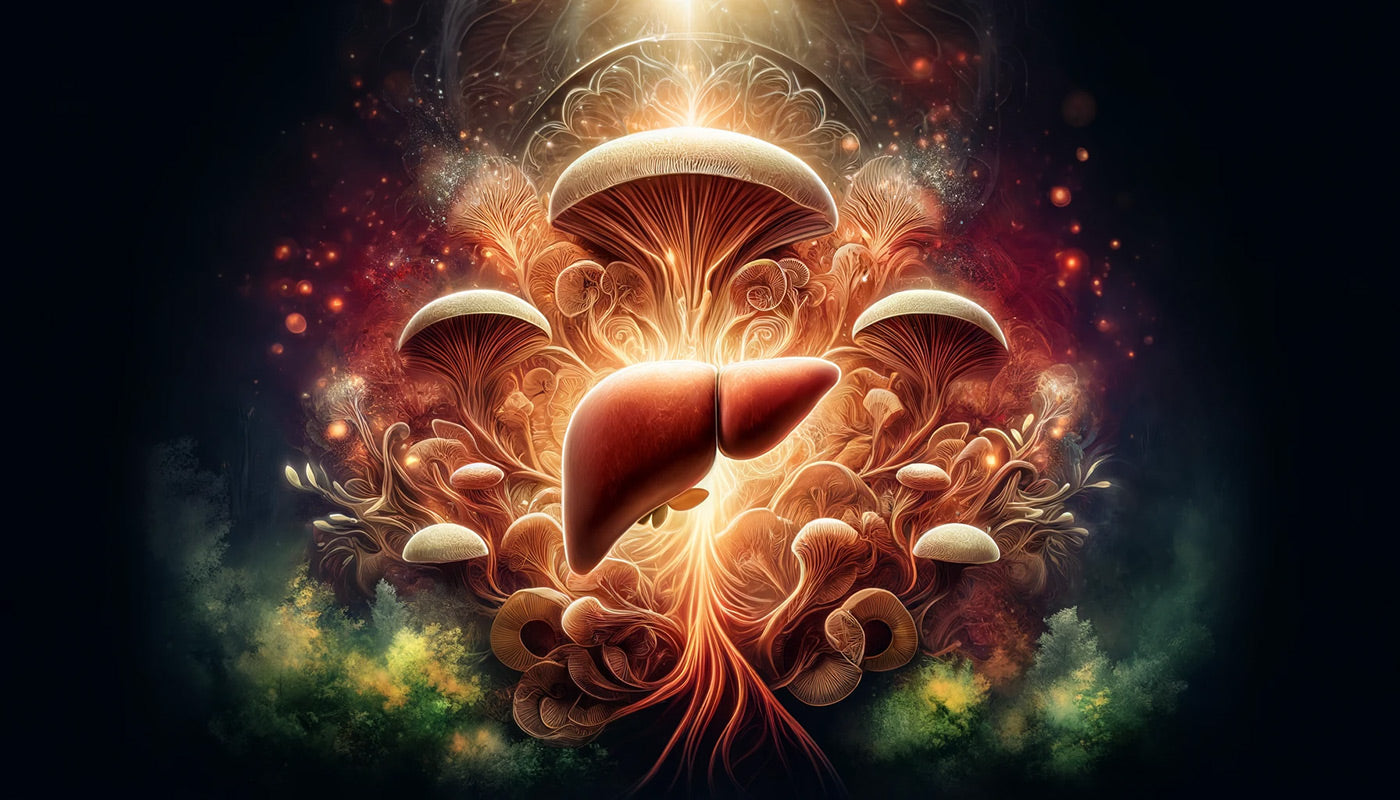Reishi mushrooms are often called the mushroom of immortality. They are often cited in traditional medicine, particularly in Asian cultures, for their hepatoprotective (liver-protecting) properties. Recent scientific studies have begun to validate what ancient practitioners have long known—reishi mushrooms possess potent liver-protective abilities.
What does the liver do for us?
The liver is a critical organ in the human body. It serves as the primary filtration system that supports metabolism, immunity, and digestion while processing toxins, aiding in nutrient absorption, detoxifying substances, and storing vitamins. Maintaining liver health is crucial for overall well-being, yet it remains one of the organs most vulnerable to damage due to lifestyle choices and environmental factors.
Recent scientific inquiries into the bioactive compounds of reishi mushrooms, particularly triterpenoids, have shed light on their potent hepatoprotective properties.
These natural compounds offer significant protection to the liver, shielding it from various harmful substances such as chemicals and pharmaceuticals. This protective effect is primarily due to their antioxidative and anti-inflammatory activities, which help mitigate liver damage under stress from toxins.
The literature robustly supports the efficacy of triterpenoids in reishi mushrooms for liver health. A review by Thilagavathi et al. (2023) highlights their hepatoprotective potential among natural remedies. Further, Noushahi et al. (2022) focus on enhancing the biosynthesis of triterpenoids, reflecting efforts to improve their medicinal availability and effectiveness. Additionally, comparative research by Kuang et al. (2017) on licorice and reishi mushrooms reveals shared hepatoprotective mechanisms, underscoring how these natural substances can shield the liver from toxins like carbon tetrachloride and acetaminophen.
These next two studies, which offer compelling evidence of Reish’s beneficial effects in acute and chronic liver stress scenarios. These investigations delve into how reishi mushrooms support liver function and fortify the body's antioxidant defences, crucial for combating the oxidative stress linked to numerous diseases, including cancer. We wrote this blog to explore these studies and highlight how reishi mushrooms can be a part of natural health care and liver wellness.
Study #1: Combatting Liver Damage with Reishi Mushroom Extract
The first study, published in the "Scientific Journal,” examined the effects of reishi mushroom extract on rats induced with acute hepatitis by paracetamol—a common pain reliever known for its potential hepatotoxicity. The research involved 60 white male rats divided into groups receiving either the mushroom extract or a standard drug treatment (Silybor).
Key Findings:
- Oxidative Stress Reduction: Rats treated with reishi mushroom extract showed decreased markers of liver damage and oxidative stress.
- Enhanced Enzyme Activity: There was a notable increase in the activity of antioxidant enzymes such as catalase and superoxide dismutase, which are crucial for protecting the liver from oxidative damage.
- Improved Liver Function: Rats that received the mushroom extract had better liver function compared to those treated with traditional drugs, suggesting a strong protective or restorative effect of the extract.
Study #2: Reishi Mushroom Extract’s Role in Antioxidant Protection
The second study focused on the effects of reishi mushroom extract on antioxidant systems in rats with chemically induced colon carcinogenesis. This research aimed to understand if the extract could also benefit other areas of the body, like the liver when fighting cancer-related oxidative stress.
Experimental Approach:
- Researchers used 120 white male rats, exposing them to 1,2-dimethylhydrazine (DMH), a chemical known to induce colon cancer, combined with daily doses of reishi mushroom extract.
- The team periodically monitored oxidative stress markers and antioxidant enzyme activity, collecting blood and liver samples.
Significant Outcomes:
- Oxidative Stress Management: There was a reduction in oxidative stress markers despite the cancer-inducing treatment.
- Stabilization of Antioxidant Enzymes: Activities of enzymes like superoxide dismutase and catalase were maintained, indicating a strong antioxidative response.
- Overall Protective Effect: The extract helped stabilize the antioxidant defence system, suggesting that it might reduce oxidative stress in the liver and throughout the body.
Conclusion: The Therapeutic Promise of Reishi Mushrooms
These studies illustrate the broad therapeutic potential of reishi mushrooms, particularly in protecting the liver from various forms of stress and damage. By enhancing the body's antioxidant capabilities, reishi mushroom extract could be a valuable natural supplement for improving liver health.
As we continue to uncover the benefits of medicinal mushrooms, Reishi mushroom stands out as a powerful ally in the quest for holistic health solutions.
Many people find that the time of day they are taking Reishi capsules varies depending on what specific effects you're looking to achieve:
- For overall wellness and immune support: If you're taking Reishi primarily for immune support or general health, you can take it anytime. Some prefer to take it in the morning as part of their daily supplement routine.
- For better sleep: Taking reishi in the evening, a couple of hours before bedtime, might be most effective. Reishi can have a calming effect, which may help to improve sleep quality.
Always consult a healthcare provider before starting any new supplement, especially if you have underlying health conditions.
Resources :
- Recent insights into the hepatoprotective potential of medicinal plants and plant‐derived compounds by Thilagavathi, R., Begum, S., Dharshini Varatharaj, S., Balasubramaniam, A., George, J. S., & Selvam, C. (2023).
- Biosynthetic pathways of triterpenoids and strategies to improve their Biosynthetic Efficiency by Noushahi, H. A., Khan, A., Noushahi, U. F., Hussain, M., Javed, T., Zafar, M., Batool, M., Ahmed, U., Liu, K., Harrison, M., Saud, S., Fahad, S., & Shu, S. (2022).
- Screening of hepatoprotective compounds from licorice against carbon tetrachloride and acetaminophen induced HepG2 cells injury. by Kuang, Y., Lin, Y., Li, K., Song, W., Ji, S., Qiao, X., Zhang, Q., & Ye, M. (2017).
- The study of oxidative stress indicators in rats with a simulated acute hepatitis and correction with a thick extract from reishi mushrooms by Herasymets, I., Fira, L., & Medvid, I. (2021).
- Effect of Dry Extract From Reishi Mushrooms on the State of Antioxidant System in Rats With DMH-Induced Colon Carcinogenesis: by Herasymets, I., Fira, L., Medvid, I., Fira, D., Yasinovskyi, O., & Grytsyshyn, L. (2023).



